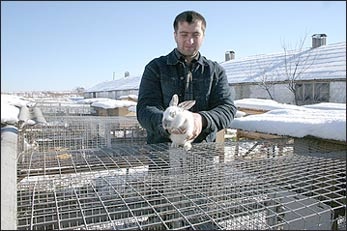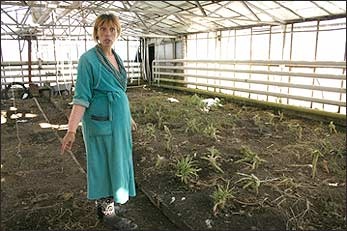Integration projects open doors for refugees in North Ossetia
Integration projects open doors for refugees in North Ossetia

Former refugee Khatuna Margieva outside her house in Tsalyk, one of three settlements in North Ossetia-Alania where UNHCR has built brick houses for refugees.
VLADIKAVKAZ, Russian Federation, Feb 8 (UNHCR) - A slow but steady solution is in sight for tens of thousands of people who fled their homes in Georgia more than 10 years ago, through legal counselling, housing and integration projects by the UN refugee agency and its partners in the Russian republic of North Ossetia-Alania.
According to government figures, up to 110,000 ethnic-Ossetian Georgians arrived in North Ossetia-Alania when the Georgian conflict peaked in 1991-1992. Some lived with relatives and friends, but most of them squatted in hostels, sanatoriums, dormitories or even abandoned cowsheds.
The majority eventually went home on their own, but today, the republic still hosts the largest number of refugees in the Russian Federation. With some 240 still remaining as recognized refugees, another close to 19,000 have been naturalised after a long process by UNHCR to help refugees and those with no legal status to become Russian citizens through close cooperation with local government and non-governmental organisations.
Some 4,000 current and former refugees are now living in 54 collective centres scattered across the republic. Nino Habalashvilli, a hunched old woman, is a long-time resident of Gizel centre, a former tourist hostel where the Soviet-style TV set has not worked since 1991 and news is passed by word of mouth.
Recalling her flight in early 1992, she says, "The armed men came and told my family to get out from our house, or they would kill us like they did to many others. I didn't want to go, but there was no choice for people like me at that time, being an Ossetian in Georgia."
Nino became a refugee with her nephew and sister, both of whom have since died, leaving the old woman to live alone in a tiny room upholstered with plywood sheets. Collective centres like Gizel are run by the government, but a lack of resources means that many of these buildings are in poor condition.
"There was no hope for many years to get a better home and better life," she says. "Just two years ago I was granted Russian citizenship, until then I was nobody - refugee status gave nothing but a paper document. Like many other people, I have to wait in a queue for accommodation for many years."
To help her cope, a few of the refugee men have renovated a room with construction materials, modest pieces of furniture and a heater provided by UNHCR.
The refugee agency provides basic assistance to the most vulnerable refugees in collective centres. This includes 20 children in Gizel centre who have been diagnosed with tuberculosis and must attend a boarding school for TB-infected children 10 km away. UNHCR provides a bus to take them there and back in the hope that they will not drop out of school and forgo their best shot at a viable future.
"At present, it is the general feeling that the vast majority of refugees do not link their future with going back to Georgia, so UNHCR's programmes have shifted accordingly to focus on integration activities," said Bill Tall, Head of the UNHCR office in North Caucasus. "Of top priority is providing legal assistance to persons of concern and assisting them in finding durable solutions."
Since 2000, UNHCR has been building brick houses for vulnerable refugee families following an integration plan developed jointly with the government of North Ossetia-Alania and aimed at facilitating the successful and smooth local integration of refugees.
So far, 200 houses - complete with water, electricity and gas supply - have been completed at three settlements at a cost of over $1 million. This project has the dual purpose of providing shelter to vulnerable families, while at the same time providing them with a permanent residence, on which consideration for citizenship often hinges.
"A whole new life," says Svetlana Saakashvili with a big smile, welcoming visitors to her new home with two bedrooms, a kitchen and a tiny hall. She, her husband Sergey and their two children live in a UNHCR-built house in Komsomolskoe settlement, about 40-minutes drive from Vladikavkaz, the capital of North Ossetia.
The couple had fled Georgia and met in exile in North Ossetia. Marrying shortly after, they spent years in hardship and poverty, during which Sergey managed to support the family with blacksmith skills learnt from his father. In 2001, the family acquired Russian citizenship. Now a small wooden shed serves as a workshop with a proper set of instruments for a small business - Sergey's goods are in demand at the market.
"He spends the whole day in his workshop, together with our five-year-old son Rustam, who considers himself a great help to daddy," says Svetlana, putting a pastry in the oven. The workshop is the result of a quick-impact project (QIP) developed by UNHCR for those refugees who need a boost to their small-scale business.
During the last two years, refugees and the local population have benefited from 31 QIPs with $30,000 provided by UNHCR. "The rabbit farm supplies local kindergartens and schools with meat for free, the rest is being sold at the market and to clients," says Maya Alikova, who heads the local administration in Tsalyk, another settlement where UNHCR has constructed houses for refugees.

The rabbit farm in Tsalyk is one of many quick impact projects designed to assist refugees and their host communities.
UNHCR bought some 200 rabbits just a year ago. Now there are more than 300 rabbits, and the numbers are multiplying every day. Local residents and refugees work on equal footing at the farm.
Another UNHCR project involves greenhouses. "The greenhouse was the first thing we saw and literally fell in love with it, this was our future," says refugee Khatuna Khitagurova, 38, as she browses through the beds with various seedlings. "The money we earned from selling our apartment was enough to buy a two-room house, which was falling to pieces, and a ramshackle greenhouse. But we knew that it will become our work and our source of life."
UNHCR helped with the materials to renovate the greenhouse, and Khatuna's husband Georgi did the renovation himself. Khatuna, pregnant with her sixth child, helps to water. "We were artists in Tbilisi, but life turned out unexpectedly, we had to learn how to garden," she says.

The greenhouse project helps supplement the family income of former refugees like Khatuna Khitagurova.
"Sometimes it doesn't take much to provide people with materials to reconstruct a greenhouse, sewing materials, veneer for souvenirs, so that they can earn enough to live and apply the skills they have," says Denis Fedorovitch, a social coordinator at the Children's Fund, describing the variety of QIPs. "It really changes people's lives."
The Children's Fund, a local non-governmental organisation, was the only humanitarian agency present in North Ossetia when the refugees started arriving in 1991. Over the years, it has become UNHCR's ears and eyes - its monitors, all refugees themselves, provide first-hand information about the needs and situation of refugees to UNHCR. They also serve as information sources to refugees living in the remote areas.
The Counselling Centre run by the Children's Fund provides refugees with the opportunity to receive free qualified legal assistance and social and medical counselling.
New actors have begun assisting integration projects. The UN Development Programme, the Swiss Development Cooperation and the Danish Refugee Council, in cooperation with UNHCR and the local government, are preparing to start an area-based integration programme in the republic that will benefit not just the refugees but also the local population.
"It's all about bringing people together," says Fedorovitch. "When local people realise that refugees can make a positive contribution, that they are willing to work, that their children can become good friends, they forget the word 'refugees' and start saying 'neighbours'."
By Valeria Sokolova in North Ossetia, Russian Federation









